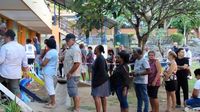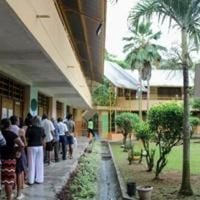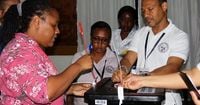In a dramatic turn of events, Patrick Herminie, leader of the United Seychelles party, has been declared the winner of the Seychelles presidential election, marking a significant shift in the political landscape of the Indian Ocean archipelago. Official results released early Sunday, October 12, 2025, confirmed Herminie’s victory over incumbent President Wavel Ramkalawan in a closely contested runoff, with Herminie securing 52.7% of the vote to Ramkalawan’s 47.3%, according to the Associated Press and Reuters.
Herminie’s win signals the return of United Seychelles to power, a party that previously governed the nation for more than four decades—from 1977 until 2020—before Ramkalawan’s historic victory five years ago. The election’s outcome not only restores the party’s dominance but also grants it a majority in parliament, following their success in the first round of the general election last month, as reported by Reuters.
At 62, Herminie is no stranger to Seychelles’ political stage. He previously served as speaker of the National Assembly between 2007 and 2016. In his victory speech at the headquarters of the electoral commission, Herminie expressed gratitude and outlined his vision for the country’s future. “The people have spoken,” he declared. “I am deeply humbled for the trust that the people have placed in me. I will be the president of all Seychellois, and I will end divisions by ceasing preferences, and giving everyone the opportunity to thrive,” he said, as quoted by Al Jazeera.
Herminie’s campaign resonated with voters on several pressing issues. He pledged to lower the cost of living, revive public services, and unite the nation. Among his promises were lowering the retirement age from 65 to 63 and implementing recommendations from a truth and reconciliation commission that investigated human rights abuses stemming from the 1977 coup and its aftermath. He also vowed to tackle the country’s severe heroin addiction crisis and to cancel a controversial hotel project on Assomption island, which environmentalists argue threatens a UNESCO-listed coral atoll.
The election was held in two rounds after no candidate secured an outright majority in the first round on September 27, 2025. Early voting began on October 9, but most Seychellois cast their ballots on October 11. The runoff was marked by spirited campaigns from both Herminie and Ramkalawan, who each sought to address the nation’s mounting challenges, particularly environmental degradation and a growing drug addiction epidemic.
Seychelles, a collection of 115 islands scattered across 1.2 million square kilometers in the western Indian Ocean, is Africa’s wealthiest country per capita, according to the World Bank. The nation is renowned for its pristine beaches and has long been a magnet for luxury tourism and international investment. However, beneath its idyllic surface, Seychelles faces significant hurdles. The country is especially vulnerable to the impacts of climate change, including rising sea levels, and has become a major transit route for heroin trafficking, contributing to one of the world’s highest rates of heroin addiction. The Agency for Prevention of Drug Abuse and Rehabilitation estimates that between 5,000 and 6,000 people—out of a population of about 120,000—use heroin, while some reports suggest the figure could be as high as 10,000.
The election campaign was further complicated by controversy over a government decision to grant a long-term lease for a 100-acre area on Assomption island to a Qatari company for the development of a luxury hotel. The lease included plans to reconstruct an airstrip to accommodate international flights. This move ignited widespread criticism from activists and opposition leaders, who argued that it prioritized foreign interests over the welfare and sovereignty of Seychelles. Just a week before the first round of voting, activists filed a lawsuit challenging the lease, adding fuel to the political fire and galvanizing public debate about the nation’s future direction.
Ramkalawan, a former Anglican priest who became Seychelles’ first president from outside United Seychelles since a coup one year after independence from Britain in 1976, campaigned for re-election on his management of the country’s economic recovery from the COVID-19 pandemic and his efforts to expand social protections. Despite these achievements, voters appeared to be swayed by Herminie’s promises of change and his critique of the incumbent’s administration, which he accused of fostering corruption and failing to adequately address the country’s most urgent problems.
Herminie’s own political journey has not been without controversy. In 2023, he was arrested on charges of witchcraft—charges that were later dropped. Addressing the issue of corruption within his own party’s long rule, Herminie acknowledged in a recent interview that United Seychelles had been in power for too long and assured that the party had since “turned the page.”
Following the official announcement of the results, images published by the Seychelles Nation newspaper showed Ramkalawan congratulating Herminie, with the two leaders shaking hands in a display of democratic civility. “I leave with a legacy that makes many presidents blush… I hope President Herminie continues to maintain such a level,” Ramkalawan remarked, as reported by Al Jazeera. Outside the electoral commission’s headquarters, thousands of Herminie’s supporters gathered, waving national flags and party banners, celebrating the victory with cheers and jubilation, as seen in videos circulating on social media.
Herminie’s victory not only marks a personal comeback—following his earlier legal troubles and a period out of the political spotlight—but also a broader return for United Seychelles. The party’s renewed grip on both the presidency and parliament sets the stage for a new era of governance, with Herminie promising to “work collaboratively and constructively to deliver the best possible outcomes for our people,” as he stated in remarks cited by the Associated Press.
Looking ahead, Herminie faces the formidable task of delivering on his ambitious campaign promises. Seychelles’ status as Africa’s richest country per capita belies deep-seated challenges, from climate vulnerability to social inequality and the ongoing heroin crisis. The nation’s strategic location has made it a target for investment and security cooperation from powers such as China, Gulf nations, and India, further complicating the delicate balance between development, sovereignty, and environmental stewardship.
As Seychelles embarks on this new chapter, the world will be watching to see whether Herminie’s administration can bridge old divisions, restore trust in government, and chart a sustainable course for the future. The hopes of many Seychellois now rest on the shoulders of their new president, who has vowed to be a leader for all.



